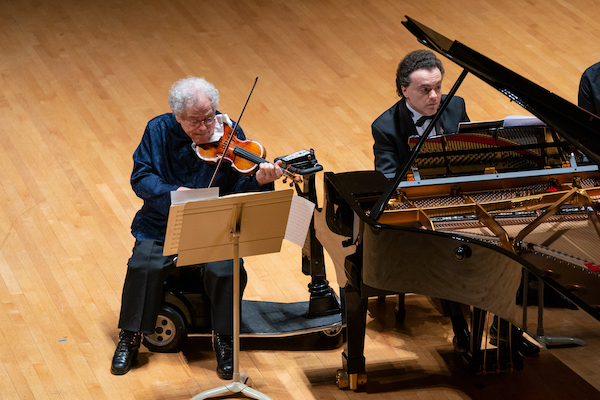Musical opposites Perlman and Kissin stay worlds apart in Celebrity Series concert

Itzhak Perlman and Evgeny Kissin performed Monday night at Symphony Hall for the Celebrity Series. Photo: Robert Torres
Itzhak Perlman and Evgeny Kissin, who performed their first-ever joint recital on a Celebrity Series program Monday night, make for a decidedly odd musical couple.
At 73, Perlman, is, after more than six decades before the public, in the twilight of an illustrious career. The qualities that always made his violin playing irresistible – the suave, elegant tone, warm vibrato and innate feeling for musical character – are still evident. However, the passage of time has taken some of the sheen off of his technique.
Conversely, Kissin is in his prime at 47, and remains as probing and remarkable a pianist as they come. His temperament is more that of a soloist, more naturally suited to concertos and solo recitals than chamber collaborations.
Their concert at Symphony Hall was, accordingly, a study in contrasts, and not a fully satisfying one, with violinist and pianist often seeming at cross musical purposes.
This was starkly apparent in the account of Mozart’s D-major Sonata, K.306, that opened Monday’s concert.
Granted, the violin writing in this 1778 score is meant to be subservient to the keyboard. In Kissin’s hands, the latter certainly dominated. Warm and elegant throughout, the outer movements, in particular, brimmed with charm, crystalline articulations, and, in the finale’s short cadenza, rich colors.
Yet Perlman, in those movements, was too often covered by the piano. When he emerged, though, his playing tended to be more aggressive and bumptious than Kissin’s. The first movement’s opening arpeggios were slashing rather than delicate and the Rondo finale’s refrains too hard-edged. Only in the slow central movement, with its singing lines and smartly balanced textures, did Perlman and Kissin settle into a true rapport.
Similar issues dogged their take on Brahms’s meditative Violin Sonata No. 2.
The first movement’s opening theme was purposefully weighted and tonally focused, its second motive strongly etched. Likewise, the Andante’s slow, introspective passages were rendered with controlled energy while the playful, spunky ones danced. And the finale’s opening violin melody came across potently.
And yet, the work remained structurally diffuse. At times, it also felt far too emotionally detached. Part of this was due to moments of spotty intonation from Perlman as well as his straitened dynamic palette which too often settled on a nexus of mezzo-forte. Ultimately, he and Kissin never completely found their groove: phrasings and articulations were sometimes disjunct, and balances tended to favor the piano.
Only in Beethoven’s Violin Sonata No. 9 did this partnership really take flight.
Beethoven’s epic 1803 “Kreutzer” sonata is music of expressive extremes and emotional perseverance, qualities Perlman and Kissin mined more capably.
They captured the stormy aura of the first movement with aplomb: Perlman navigated Beethoven’s torrid, neo-Baroque figurations with compelling energy, while Kissin’s delivered a tempestuous account of the devilish passagework in the development.
Their fluent account of the second-movement variations was aptly flexible and mercurial: bright and cheerful in the theme and first two variations, fresh and dreamy in the fourth and the coda. The brooding third variation was focused and clean-textured. A passionate, tautly rhythmic account of the finale brought the sonata to a rousing, energetic conclusion.
Afterwards, the duo gave two encores: Leopold Auer’s transcription of Lensky’s aria from Tchaikovsky’s Eugene Onegin and Fritz Kreisler’s arrangement of Manuel de Falla’s Spanish Dance.
Perlman introduced the first with characteristic droll charm. He and Kissin played both with fiery, ingratiating panache.
Celebrity Series presents Joshua Bell, Steven Isserlis, and Jeremy Denk playing music by Mendelssohn, Shostakovich, Rachmaninoff, and Ravel 5 p.m. Sunday at Symphony Hall. celebrityseries.org; 617-482-2595
Posted in Performances